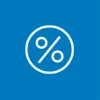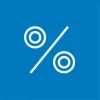Many market observers in Switzerland expect the Swiss National Bank (SNB) to lower its interest rates in the near future. Such a move would result in lower mortgage interest rates, lower interest paid on fixed deposits, and – with some delay – lower interest rates for savings.
But low interest rates do not necessarily need to mean lower returns, as long as you take the right measures. This moneyland.ch guide tells you what you need to pay attention to and which popular investment vehicles are suitable for times of sinking interest rates.
Savings accounts
Savings accounts become less attractive when interest rates go down. The reason is obvious: You are paid less interest for your money. Often, the nominal interest rate does not even exceed the inflation rate, resulting in a negative real interest rate.
Savings accounts are primarily suitable for holding your emergency fund, and for short-term savings goals. How much money you keep in savings accounts also depends on your personal risk tolerance. Savings accounts can be suitable for risk-averse savers who are willing to accept lower returns as a trade-off. If you want to earn higher returns, then a well-diversified investment in stocks and ETFs is a better option for mid-length and long-term investing.
The advantage of savings accounts compared to fixed-interest investment vehicles like fixed deposits and medium-term notes is their flexibility. Savings account typically have less restrictions on withdrawals than fixed deposit accounts. The interest rates of savings accounts are relatively slow to react to changes in the interest environment, and often rise and fall slower than those of fixed-interest products. You can find current rates in the Swiss savings account comparison on moneyland.ch.
Nominal interest versus real interest: When people talk about interest rates, they are generally referring to nominal annual interest rates. The nominal interest is the interest paid out at the published rate, and declared on your tax statements. It does not account for inflation. But if you also account for the inflation rate, you get the real interest rate. For example, if you are paid a nominal 1.5 percent interest on your savings for one year, but the inflation rate in that year is 2 percent, the real interest rate is a negative -0.5 percent. So, your savings lost 0.5 percent of their value in terms of purchasing power. That means the amount of goods or services you can obtain with your savings is smaller. Before you allow yourself lured by what appear to be high interest rates, you should first understand the concept of real interest rates.
Private accounts
Private accounts are generally not a sensible place to hold wealth. The interest rates are, in nearly every case, lower than those of savings accounts. Many Swiss banks do not pay interest on private account balances at all. Private accounts are primarily designed for making financial transactions.
Fixed deposit accounts and medium-term notes
The interest rates for new subscriptions to fixed deposits and medium-term notes are constantly changing. The banks adapt their offers based on how they believe the interest environment will develop in the future. The interest rates of new offers fluctuate more strongly than the interest rates of savings accounts, which are typically only adjusted several times per year. But the difference is that once you have subscribed to a fixed-deposit account or a medium-term note, the interest rate remains the same for the entire fixed term you chose.
In a sinking interest environment, using fixed deposit accounts and medium-term notes can make sense. You can lock in a favorable interest rate for the term of your choice. Typically, the interest rates of fixed deposits are higher than those of savings accounts.
The disadvantage: Your money is tied up until the end of the fixed term. You should only use these products to invest money that you will not need until the end of the term. You also carry an opportunity risk because if market interest rates end up going up during the fixed term, you will be stuck with what could then be a low interest rate.
The difference between medium-term notes and fixed deposits is that medium-term notes are securities, while fixed deposits are bank accounts. Medium-term notes must be held in a stock brokerage account, and you may be charged custody fees for this. The interactive Swiss fixed deposit and medium-term note comparison makes it easy to find suitable offers.
Choose the right fixed term: Medium-term notes and fixed deposit accounts generally come as a series of offers, each with a different fixed term. Typically, you can choose terms of between one and 10 years. Some banks also offer fixed deposit accounts with terms of just a few months. Which term is best for you depends on several different factors:
- For how long are you able and willing to keep your money locked up? Your money is blocked for the entire term, and cannot be withdrawn.
- How do you expect interest rates to develop in the distant future? Your interest rate is fixed. If interest rates end up climbing faster than you expected, your tied-up capital will not be able to profit from them. So, you carry an opportunity risk, and this risk is bigger the longer the fixed term is. If you believe that interest rates will remain low for a long period of time, and you end up being right, then you can profit from having locked in a higher interest rate. But there is no way to accurately predict how interest rates will develop.
Bonds
The interest rates of bonds go down when central banks lower their key interest rates, or when the market expects lower interest rates in the future. But if you buy bonds at a time when interest rates are high, their value will go up if interest rates fall. Existing, high-yield bonds gain in value because you can benefit from above-average interest. Alternatively, you can resell the bond to another investor at a favorable price.
When you invest in bonds, there is always a risk that the borrower may default on the loan. Unlike medium-term notes, bonds are not covered by Swiss bank depositor protection. Make sure to weigh the risks with the returns before buying a bond. Most of all, you should take a critical look at the borrower’s creditworthiness. Pay attention to the rule of thumb: The higher the interest rate, the riskier the investment is.
Stocks and ETFs
Well-diversified investments in the stock market pay off financially – at least they always have in the past, as the historical returns calculator on moneyland.ch shows. Compared to savings accounts and fixed-interest investments, the long-term returns of stocks are much higher. Over shorter investment terms though, the risk of loss is also higher.
Equities like stocks and exchange-traded funds (ETFs) will, in all likelihood, remain a promising investment. For that reason, the point in time at which you invest is of secondary importance. However, sinking interest rates often correlate with rising stock prices.
All you need in order to invest in stocks and ETFs is a stock brokerage account. There are big differences in the fees charged by different Swiss banks. You can compare the costs for the kind of investments you want to make using the interactive stock brokerage account comparison on moneyland.ch. Swiss neobanks like Yuh and Neon also let you invest in equities, but the selection of stocks and ETFs is relatively small. If you prefer not to buy and sell equities yourself, you can use a conventional asset management service or an online asset management service (robo advisor) instead.
More on this topic:
Compare stock brokerage accounts now
How to invest money in Switzerland
Where can I earn the most interest?







